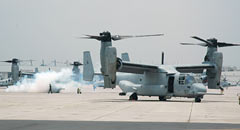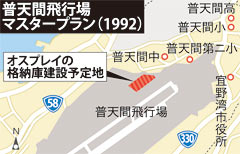US Marine Corp to deploy Osprey at Futenma Air Station

An MV-22 Osprey at the Marine Corps Air Station New River, North Carolina, United States. The Japanese government notifies Okinawa of the deployment of the MV-22 Osprey.
June 7, 2011 Ryukyu Shimpo
On June 6, the Okinawa Defense Bureau (ODB) officially notified the prefectural government and relevant municipalities of Ginowan City, Nago City and Kin Town that the U.S. Marine Corps will deploy MV-22 Osprey vertical takeoff and landing transport aircraft at the Futenma Air Station from 2012.
It has been confirmed that the Marine Corps will conduct daily familiarization training flights for Osprey crew in northern area of Okinawa.
In the past, the Japanese government has avoided giving notification of the deployment of the Osprey, which the governor of Okinawa, Hirokazu Nakaima, is known to oppose.
The Osprey is planned to replace the CH-46 Sea Knight helicopters, and it is claimed that in comparison with the Sea Knight the noise from the Osprey is greater during take-off and landing, which will inevitably attract strong protest within the prefecture.

“Master Plan for Marine Corps Air Station Futenma”
The ODB explained to the prefectural government and the municipalities that the U.S. government had contacted the Japanese Ministry of Defense regarding the deployment of the MV-22, saying, “No final decision has been made regarding the exact deployment schedule, but the MV-22 is likely to replace the CH-46 Sea Knight helicopters of III Marine Expeditionary Force currently deployed at Futenma from the end of 2012.”
On this basis, the ODB said, “We will discuss the notification process regarding the deployment of the MV-22 at Futenma Air Station in the context of the Japan-U.S. alliance.”
The prefectural government asked the ODB about the Japanese government’s position on the deployment, but as of June 6, the ODB had not responded.
The ODB gave notification of the deployment of the MV-22 to Futenma Air Station to municipalities such as Nago City, to which the facilities currently at Futenma may be relocated, Kin Town, which hosts Camp Hansen, and Higashi Village, which hosts the Jungle Warfare Training Center. It seems that the ODB assumes that the MV-22 will carry out training flights to those U.S. military bases.
The deployment could result in changes, such as increases in the level of noise around Futenma Air Station.
In 1992, in its “Master Plan for Marine Corps Air Station Futenma,” the U.S. Department of the Navy clearly indicated its intention to locate the base for the MV-22 in the northwest section of the Futenma Air Station.
The Marine Corps announced in autumn 2010 that two squadrons of MV-22 Ospreys would replace 24 CH-46 Sea Knight helicopters in two lots, in October 2012 followed by October 2013.
There has been continued concern in Okinawa regarding the safety of Osprey because in its developmental stage there were significant failures during flight-testing and one combat-zone crash since.
It is also pointed out that in comparison with the CH-46, the noise from the Osprey increases during hovering, takeoff and landing and that it requires more training hours for the pilot to get used to its operation, something which will in turn also increase the overall noise level.
(English Translation by T&CT, Mark Ealey)
Previous Article:Nijima team wins V6 at the Itoman Harley race
Next Article:Fresh traces suggesting that dugong ate seaweed further out in Oura Bay
[Similar Articles]
- U.S. Government to deploy MV-22 Osprey to Futenma in July, ahead of schedule
- “It was so loud that I couldn’t sleep”, Osprey land on MCAS Futenma just before 11:00 p.m.
- MV-22 Osprey belonging to Futenma base makes emergency landing at Amami Airport without advance notification.
- Heads of 38 municipalities oppose the deployment of MV-22 Osprey at Futenma Air Station
- Ginowan Mayor’s sit-in-protest against the Osprey deployment
 Webcam(Kokusai Street)
Webcam(Kokusai Street)


